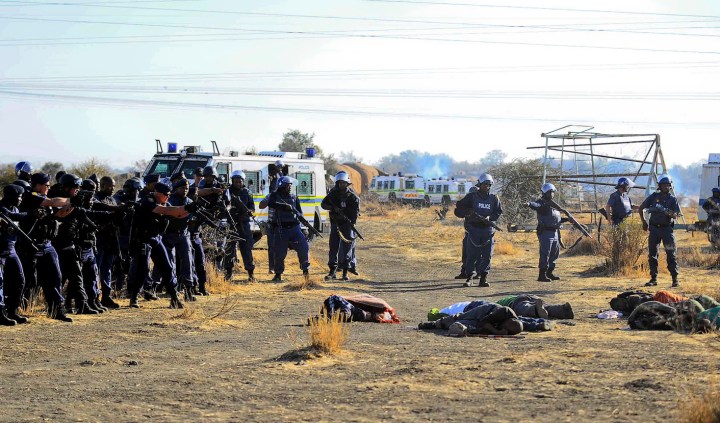South Africa
Marikana Commission: All for nought?

The Marikana Commission has just over 30 working days left until it is to wrap up on 31 July, and it has suddenly descended into a penalty shootout situation. Still to come are some two dozen police witnesses, ANC deputy president and mining magnate Cyril Ramaphosa, Police Minister Nathi Mthethwa and the secret police informer, Mr X. By GREG MARINOVICH.
The Commission has previously been the site of lengthy and tedious cross-examination of unwilling witnesses. The obstructive approach of the National Commissioner Riah Phiyega, and the many hours trying to get Deputy Police Commissioner Lt. Gen. Mirriam Mbombo to explain just how she was unaware of the miners’ deaths for so long, are just two examples.
Lawyers such as the Human Rights Commission’s advocate Michelle Le Roux, Dali Mpofu for the surviving miners – and others – have month after month laboured to get at the truth behind South Africa’s worst incident of state violence since Apartheid ended.
Now, the lawyers for the various parties, including the families of the dead miners and policemen, are to be given scant minutes to cross-examine many of the key witnesses.
A case in point was the brief appearance of Tactical Response Team commander Captain Paul Bismark Loest, who moved the line of TRT up to block the gap as miners fled the koppie at Scene 1. Several of the advocates made complaints about having too little time to cross-examine Loest. He is the policeman we see in the video of the shooting who calls for the cops to cease fire. He was literally on the front line.
Loest was a key witness, and has in fact corroborated the fact that within a couple of minutes of the shooting, the high ranking officers at the command centre at Lonmin mine had indeed been told that many miners had been wounded or killed.
He has also been a witness to the fact that there was just an eight-second gap between when the teargas and rubber bullets were fired by the public order policemen and the deadly volley of automatic gunfire that killed.
Yet Loest is also a trained medic who failed to attend to even one of the wounded miners after his men shot them. Three days before, he had attended to Warrant Officer Tsietsi Monene, when two policemen and three miners were killed in the clash on 13 August.
In the circumscribed cross-examination it became clear that policemen who saw it as their duty to tend to their own wounded, did not see the same obligation extended to civilians shot by police. Loest said his immediate duty was to ensure none of his men were suicidal after they had shot and killed the miners. Since the massacre, Loest has been medically boarded for post-traumatic stress disorder.
As new witnesses are called before the Commission, the lawyers have had to barter with each other and Judge Ian Farlam for cross-examination time, trading minutes. They, and more importantly, their clients, are not happy.
At a certain stage staff at Daily Maverick referred to the inquiry as The Tea Commission, as it was more notable for its frequent tea and ‘comfort’ breaks than for progress in delving into the massacre.
Every courtesy was extended to witnesses – who did not necessarily appear trustworthy or whose stories were not always consistent – to ensure they were comfortable, yet the families of the killed miners, and policemen, wait to hear why their loved ones died so needlessly.
The key police informer, Mr X, is due to be on the stand for five days. Mr X is a miner and impimpi who was in the strikers’ inner circle, and is crucial to the police’s assertions that the miners intended to confront the police violently.
We do not yet know how long the police minister, Nathi Mthethwa, will be on the stand for. Will he be there long enough for lawyers to find out what hand government had in dictating what happened at Marikana?
We have only heard from one miner who survived the shooting, despite there having been 276 who were arrested at Small Koppie, where we have heard of indiscriminate killings and even executions.
There are Lonmin managers that might shed light on how a labour dispute became a war under their watch.
The Commission has revealed much of how the massacre happened. What we have little proof of is why. Now that certain facts are no longer disputed, and the police prevarications are pointless, it could be that the truth will emerge.
Which could explain why President Zuma and his advisors waited until the elections to announce that the Commission was essentially being wound down. DM
Photo: South African police check the bodies of striking mineworkers shot dead at the Wonderkop informal settlement near Marikana platinum mine, Rustenburg, South Africa, 16 August 2012. EPA/STR


















 Become an Insider
Become an Insider